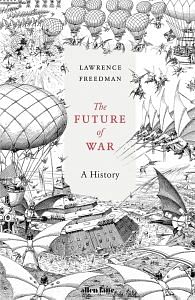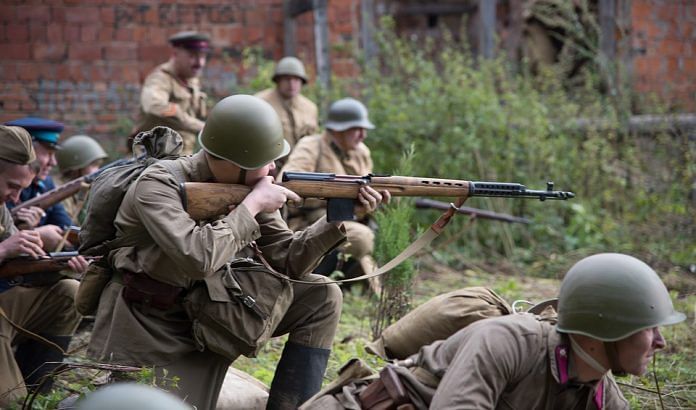‘The Future of War’ tracks diverse themes through the long arc of modern warfare from mid-19th century to the present – and of course the future.
Armies always prepare to fight the last war — so goes one of the most tenacious beliefs about inherent conservatism of the military. This may be true, up to a point. As with many other massive organisations, militaries find it difficult to break out of their standard modes of operation. But the wider claim that the future of war has always been conjured in the image of the recent past does not really hold up. As Sir Lawrence Freedman shows in his new book, there are recurrent themes in the way that future wars have been imagined over the past century and a half: thinking about the future of war has its own history.
Few scholars are as well placed as Freedman to analyse this history. (Full disclosure: I was his student many years ago.) Over a long, distinguished and remarkably productive career, Freedman has been an outstanding historian of contemporary warfare. The sheer range of his oeuvre is daunting. From nuclear strategy to cold war history, conflicts in the Middle East to those in Ukraine — his work has touched upon almost every aspect of war and strategy in the 20th century and beyond. Equally impressive is the accessibility of his writings to a wide audience. All these qualities are on display in his latest book, The Future of War: A History.
The book also underscores an important aspect of Freedman’s scholarship that isn’t noticed enough. Throughout his career, he has been interested not just in analysing conflicts and strategies, but has also paid attention to how people talk about these: what concepts and categories tend to be invoked, which narratives come to the fore or remain in the background, and why. As a student of sociology, Freedman has retained a keen interest in the political sociology of knowledge, its production and dissemination. This has given his work an unmatched depth in a field that tends to be dominated by political scientists or military historians.
In this book, Freedman skilfully brings together the history of modern wars and the manner in which academics and intellectuals have grappled with them. While contemporary political science might be obsessed with prediction, a range of agendas has impinged on the writing on future war: “The aim was to prescribe courses of action that would improve security or avert catastrophe, encouraging governments to put more resources into the military, or shift priorities, or recognise the threat posed by some rising power, or redouble their efforts to resolve the most pressing disputes, or find a way to abolish categories of weapons or even outlaw war.”
Drawing on a diverse array of sources from fiction to military doctrine, the book tracks these themes through the long arc of modern warfare from the mid-19th century to the present – and of course the future.
Freedman emphasises two recurrent themes in the way in which people have tended to think about wars of the future. The first is an increasing concern with the difficulties of limiting wars in time and space, so that their destructiveness could be contained and subordinated to the political purposes for which they were waged.
Second, and related, was a constant search for a decisive use of force to knock the enemy out, and end a war speedily and successfully. Far less attention was paid, he argues, to what would follow if a first blow failed to flatten the opponent or how a range of non-military factors might shape the course of any conflict.
An idealised version of the “decisive battle” was lent credence by the wars of German unification in the 19th century. Although the World War-I showed the difficulty of achieving this in the context of industrial war amongst the great powers, the search for a decisive first blow continued and focused on the vulnerabilities of the adversary’s civilian population. These efforts rose dramatically during the World War-II, with the Nazi’s attempts to exterminate European Jews, the strategic bombing campaigns against major cities in Europe and Japan, and eventually the dropping of atomic bombs on Hiroshima and Nagasaki.
The advent of nuclear weapons launched a massive wave of writings on the future of war. Because nuclear weapons were (thankfully) never used after 1945, thinking about warfare against a nuclear backdrop saw the emergence of civilian strategists to the fore of these debates. The question of how to credibly threaten or use force while avoiding nuclear catastrophe kept policymakers and soldiers, academics and publicists busy for most of the Cold War.
The collapse of the Soviet Union —the last act of decolonisation in the 20th century — saw a spurt in ethnic conflicts in Africa and Balkans and increasing Western involvement in them. Even as governments struggled to evolve policies for intervening (or not) in these tangled conflicts, scholars began deploying tools of quantitative social science to get an analytical grip on them. Freedman’s analysis of these conflicts is as perceptive as his mordant observations on some of this body of scholarship.
In the new century, another set of topics that had remained marginal for decades got unprecedented attention: terrorism and insurgency. These have since morphed into concerns about how to fight “hybrid wars” that would also involve drones and cyber attacks. As Freedman notes, thanks to technological changes currently underway thinking about the future of war seems to have an assured future. But he cautions against thinking about it in ways that valorise new technology without taking adequate account of the shifting political purposes for which wars are likely to be waged in the 21st century.
One thing that doesn’t really come into focus in Freedman’s sweeping account is the role of imperial conflicts in shaping European thinking about future wars in the 20th century. Although he notes the rise of the “small wars” genre with Charles Calwell’s 1886 book of the same title, Freedman does not pay attention to these until he gets to wars of decolonisation in places like Vietnam.
Yet, as many historians have reminded us over the past couple of decades, Europe’s colonial encounters played a significant role in shaping expectations of how wars would be waged against other adversaries, including great powers.
To take but one example, think of the importance “imperial policing” in Iraq after the WW-I on ideas of strategic bombardment. Similarly, as the book suggests, “peripheral” wars of our times impinge on the strategic discourse on the return of great power conflict. Even as we struggle to make sense of this future, we can ask for no better guide than Lawrence Freedman.
Srinath Raghavan is a senior fellow at the Centre for Policy Research, Delhi.

‘The Future of War: A History’ by Lawrence Freedman was published by Penguin UK.



